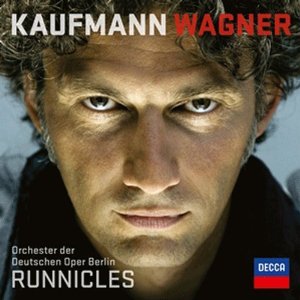|
|
|
|
|
|
|
|
|
The Star Ledger, February 15, 2013 |
| Ronni Reich |
|
|
|
Wagner: Jonas Kaufmann |
|
|
 Jonas
Kaufmann’s new CD of Wagner arias and scenes — out this week, just as he
begins a run at the Metropolitan Opera in the title role of "Parsifal" —
suggests he could be thrown into nearly any of the composer’s tenor roles
and triumph. He can slice through a voluminous orchestra in percussive,
anguished or exultant phrases yet eloquently caress a lyrical phrase with
equal expertise. Jonas
Kaufmann’s new CD of Wagner arias and scenes — out this week, just as he
begins a run at the Metropolitan Opera in the title role of "Parsifal" —
suggests he could be thrown into nearly any of the composer’s tenor roles
and triumph. He can slice through a voluminous orchestra in percussive,
anguished or exultant phrases yet eloquently caress a lyrical phrase with
equal expertise.
Those who heard him sing delicate Schubert songs at
the McCarter Theatre Center in Princeton recently may be shocked at the heft
he brings from the outset of Siegmund’s Sword Monologue from "Die Walküre,"
with baritonal colorings in the opening declaration giving way to a
prolonged, soaring "Wälse" cry. The singing shifts seamlessly from heroic to
romantic as he sings of Sieglinde’s gaze; he leans into gushing phrases with
a sway, giving the impression of one drunk with pleasure.
Donald
Runnicles leads the orchestra in an impassioned and detailed performance,
especially notable for its powerful and polished brass section.
In
Siegfried’s "Daß der mein Vater nicht ist," Kaufmann’s voice penetrates over
the gently undulating orchestra. Then he allows his tone to grow pale and
vulnerable as he thinks about his mother’s death. His innocent whisper gives
way strikingly to his full voice, perfectly in line with a character who
seems childlike and unaware of his own strength. Runnicles keeps a brisk
pace through perky, impeccably executed birdsong.
"Am stillen Herd"
from "Die Meistersinger von Nürnberg" features beautifully long, sculpted
lines from Kaufmann. The ease and evenness of his sumptuous sound from its
dark low range to its gleaming top earn the "Mastersinger" title.
At
the beginning of "In fernem Land" from "Lohengrin," Kaufmann showcases
exquisite piano singing, floating his voice without losing the core of the
sound. His tone beams resplendently at the mention of the grail. He and the
orchestra create a suspenseful, authoritative performance, capturing the
reverence with which the title character regards his office. Kaufmann
includes a second, rarely recorded verse that the composer cut before the
premiere.
The collaboration is also fruitful through selections from
"Rienzi" and "Tannhaüser."
Perhaps most telling about Kaufmann as an
artist, however, is his decision to sing the Wesendonck-Lieder, which Wagner
wrote for female voice. As asserted in a program note, the text is fully
convincing from the male perspective, at least with Kaufmann singing Felix
Mottl’s orchestral arrangements.
"Der Engel" features a wistful tone
augmented by a satiny violin solo. His voice pours like thick honey, slow
and luxurious, throughout the contemplative "Im Treibhaus."
Kaufmann
matches the explosive orchestral introduction to "Schmerzen." The musicians
give a transfixing rendition as waves of sound bring angst-ridden beginnings
to a joyous conclusion.
The recording doesn’t include "Parsifal," but
is still a promising indicator of what Kaufmann may do onstage over the next
three weeks.
|
|
|
|
|
|
|
|
|
|
|
|
|
|
|
|
|
|
|